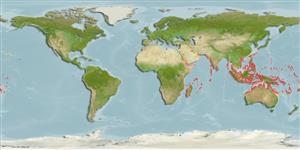Common names from other countries
>
Eupercaria/misc (Various families in series Eupercaria) >
Haemulidae (Grunts) > Plectorhinchinae
Etymology: Plectorhinchus: Greek, plektos = plaited + Greek, rhyngchos = snout (Ref. 45335).
More on author: Linnaeus.
Environment: milieu / climate zone / depth range / distribution range
Ecologia
marinhas associadas(os) a recifes; intervalo de profundidade 2 - 25 m (Ref. 37816). Tropical; 30°N - 27°S, 32°E - 167°W
Indo-West Pacific: East Africa (Ref. 33390) to western Indian Ocean to Papua New Guinea and New Caledonia.
Tamanho / Peso / Idade
Maturity: Lm ? range ? - ? cm
Max length : 72.0 cm SL macho/indeterminado; (Ref. 37816)
Espinhos dorsais (total) : 12 - 14; Raios dorsais (total) : 17 - 20; Espinhos anais: 3; Raios anais : 7 - 8. This species is distinguished by the following characters: chin with 6 pores, no median pit; gill rakers on first gill arch 9-11 + 1 + 20-23 = 29-34; Dorsal fin with XII-XIV (usually XIII),17-20 with 3rd or 4th spines longest; lips fleshy, greatly swollen with age; scales ctenoid (rough to touch); lateral line tubed scales about 55-65; body depth 2.6-2.9 in SL; caudal fin rounded in juveniles, truncate in adults. Colour: juveniles with connected black blotches and spots that gradually break up into horizontal stripes; pectoral fins black in juveniles becoming uniform yellow in adults; tail spotted with age; adults with 6 to 12 broad dark brown, blue-brown or black stripes that persist on the belly and join horizontally across the nape and snout with anterior part of pale interspaces yellow forming 2 bright yellow stripes across interorbital and 2 around snout; eye usually yellow; fins yellow with black margins to vertical fins and black spots, pectoral fins uniform yellow with red-brown, chocolate, or blackish base, pelvic fins yellow with base red-brown, scarlet, or dark brown (Ref. 47695, 90102).
Inhabits coral reefs and inshore rocky reefs (Ref. 30573). Juveniles solitary, inhabits clear shallow protected lagoon; adults may be solitary or occur in aggregations (Ref. 37816). by handline and spear. Marketed fresh, a small quantity is salted (Ref. 47695).
Ciclo de vida ou comportamento de acasalamento
Maturities | Reprodução | Spawnings | Egg(s) | Fecundities | Larvas
Oviparous, distinct pairing during breeding (Ref. 205).
Randall, J.E. and C. Anderson, 1993. Annotated checklist of the epipelagic and shore fishes of the Maldives Islands. Ichthyol. Bull. of the J.L.B. Smith Inst. of Ichthyol. (59):1-47. (Ref. 11303)
Status na Lista Vermelha da UICN (Ref. 130435)
CITES (Ref. 128078)
Not Evaluated
Ameaça para os humanos
Harmless
Uso pelos humanos
Pescarias: espécies comerciais
Ferramentas
Relatórios especiais
Baixar XML
Fontes da internet
Estimates based on models
Preferred temperature (Ref.
115969): 26.1 - 29.3, mean 28.5 (based on 2234 cells).
Índice de diversidade filogenética (Ref.
82804): PD
50 = 0.5000 [Uniqueness, from 0.5 = low to 2.0 = high].
Bayesian length-weight: a=0.01380 (0.00670 - 0.02842), b=3.00 (2.83 - 3.17), in cm Total Length, based on LWR estimates for this Genus-body shape (Ref.
93245).
Nível Trófico (Ref.
69278): 3.9 ±0.6 se; based on size and trophs of closest relatives
Resiliência (Ref.
120179): Baixo, tempo mínimo de duplicação da população 4,5 - 14 anos (Preliminary K or Fecundity.).
Fishing Vulnerability (Ref.
59153): High vulnerability (55 of 100).
